 Libri di Michael Ignatieff su Unilibro.it) Libri di Michael Ignatieff su Unilibro.it)
|
|
2022 |
 Title :
Sulla consolazione. Trovare conforto nei tempi bui
Title :
Sulla consolazione. Trovare conforto nei tempi buiAuthor: Ignatieff Michael Publisher: Vita e Pensiero Consolare: trovare conforto insieme, cercare di condividere la sofferenza di qualcuno o di sopportare meglio la nostra. È un'esperienza che accompagna tutti, donne e uomini, da sempre. Ma se un tempo si contava sull'aiuto delle promesse religiose o delle convinzioni filosofiche, oggi ci ritroviamo sempre più muti e inermi, e sempre più soli. Da questa esperienza comune di spaesamento, paura, solitudine di fronte al dolore, portata ancor più a fior di pelle dalla pandemia, parte Michael Ignatieff, storico di fama internazionale, per chiedersi se sia possibile imparare qualcosa dalle ricerche di consolazione del passato. Oggi che il mondo ha smarrito i significati profondamente radicati nelle tradizioni religiose, che il premio della consolazione ha perso ogni attrattiva per una cultura che insegue il successo, è possibile trovare affinità e suggestioni in quei vissuti così lontani e così dolorosamente simili ai nostri? Trovare parole antiche e nuove per ciò che sembra non avere più parole? La risposta di Ignatieff è questa serie di ritratti, disposti in ordine storico, dedicati ciascuno a un personaggio che, trovandosi in condizione estreme, si è rivolto alle tradizioni che aveva ereditato per cercare consolazione: dagli autori dei Salmi, da Giobbe e san Paolo, passando per le lacrime di Cicerone e la depressione di Hume, il balsamo della filosofia, dell'arte, della musica, fino ad arrivare agli eroi della testimonianza civile, come Anna Achmatova o Primo Levi, e all'accudimento della dignità di una vita vicina alla fine tenacemente perseguito da Cicely Saunders, la fondatri € 20,00
Scontato: € 19,00
|
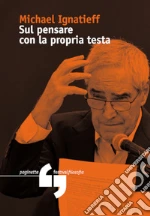 Title :
Sul pensare con la propria testa
Title :
Sul pensare con la propria testaAuthor: Ignatieff Michael Publisher: Consorzio Festivalfilosofia È ancora significativo per la filosofia politica contemporanea ragionare sui due concetti di libertà, negativa e positiva, secondo il modello di Isaiah Berlin? € 3,50
|
|
1919 |
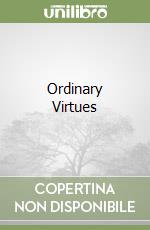 Title :
Ordinary Virtues
Title :
Ordinary VirtuesAuthor: Michael Ignatieff Publisher: HARVARD UNIVERSITY PRESS € 13,40
|
|
|
1918 |
 Title :
The Ordinary Virtues (CD Audiobook)
Title :
The Ordinary Virtues (CD Audiobook)Author: Ignatieff Michael, Ignatieff Michael (NRT) Publisher: Baker & Taylor € 32,30
|
 Title :
The Ordinary Virtues (CD Audiobook)
Title :
The Ordinary Virtues (CD Audiobook)Author: Ignatieff Michael, Ignatieff Michael (NRT) Publisher: Baker & Taylor € 27,70
|
 Title :
The Ordinary Virtues (CD Audiobook)
Title :
The Ordinary Virtues (CD Audiobook)Author: Ignatieff Michael, Ignatieff Michael (NRT) Publisher: Baker & Taylor € 83,20
|
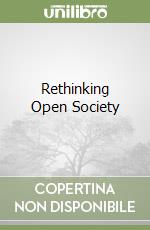 Title :
Rethinking Open Society
Title :
Rethinking Open SocietyAuthor: Ignatieff Michael, Roch Stefan Publisher: Baker & Taylor € 32,70
|
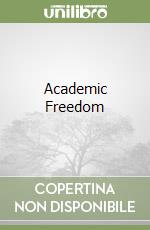 Title :
Academic Freedom
Title :
Academic FreedomAuthor: Michael Ignatieff Publisher: Central European Uni Press € 16,70
|
|
|
1917 |
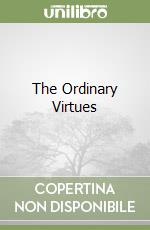 Title :
The Ordinary Virtues
Title :
The Ordinary VirtuesAuthor: Ignatieff Michael Publisher: Harvard Univ Pr € 25,90
|
|
|
1913 |
 Title :
Fire and Ashes
Title :
Fire and AshesAuthor: Ignatieff Michael Publisher: Harvard Univ Pr In 2005 Michael Ignatieff left his life as a writer and professor at Harvard University to enter the combative world of politics back home in Canada. By 2008, he was leader of the country's Liberal Party and poised--should the governing Conservatives falter--to become Canada's next Prime Minister. It never happened. Today, after a bruising electoral defeat, Ignatieff is back where he started, writing and teaching what he learned. What did he take away from this crash course in political success and failure? Did a life of thinking about politics prepare him for the real thing? How did he handle it when his own history as a longtime expatriate became a major political issue? Are cynics right to despair about democratic politics? Are idealists right to hope? Ignatieff blends reflection and analysis to portray today's democratic politics as ruthless, unpredictable, unforgiving, and hyper-adversarial. Rough as it is, Ignatieff argues, democratic politics is a crucible for compromise, and many of the apparent vices of political life, from inconsistency to the fake smile, follow from the necessity of bridging differences in a pluralist society. A compelling account of modern politics as it really is, the book is also a celebration of the political life in all its wild, exuberant variety. € 23,20
|
 Title :
The Hedgehog and the Fox
Title :
The Hedgehog and the FoxAuthor: Berlin Isaiah, Hardy Henry (EDT), Ignatieff Michael (FRW) Publisher: Princeton Univ Pr 'The fox knows many things, but the hedgehog knows one big thing.' This ancient Greek aphorism, preserved in a fragment from the poet Archilochus, describes the central thesis of Isaiah Berlin's masterly essay on Leo Tolstoy and the philosophy of history, the subject of the epilogue to War and Peace. Although there have been many interpretations of the adage, Berlin uses it to mark a fundamental distinction between human beings who are fascinated by the infinite variety of things and those who relate everything to a central, all-embracing system. Applied to Tolstoy, the saying illuminates a paradox that helps explain his philosophy of history: Tolstoy was a fox, but believed in being a hedgehog. One of Berlin's most celebrated works, this extraordinary essay offers profound insights about Tolstoy, historical understanding, and human psychology. This new edition features a corrected text that supplants all previous versions, English translations of the many passages in foreign languages, a new foreword in which Berlin biographer Michael Ignatieff explains the enduring appeal of Berlin's essay, and a new appendix that provides rich context, including excerpts from reviews and Berlin's letters, as well as a startling new interpretation of Archilochus's epigram. € 11,60
|
|
2007 |
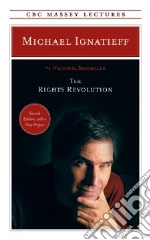 Title :
The Rights Revolution
Title :
The Rights RevolutionAuthor: Ignatieff Michael Publisher: House of Anansi Pr Since the proclamation of the Universal Declaration of Human Rights in 1948, human rights have become the dominant language of the public good around the globe. Nowhere is this more apparent than in Canada. The long-standing fights for aboriginal rights, the linguistic heritage of French-speaking Canadians, and same-sex marriage have steered the country into a full-blown ?rights revolution” ? one that is being watched carefully around the world. Are group rights jeopardizing individual rights? When everyone asserts his or her rights, what happens to collective responsibility? Can families survive and prosper when each member has rights? Is rights language empowering individuals while weakening community? These essays, taken from Michael Ignatieff's famous Massey Lectures, addresses these questions and more, arguing passionately for the Canadian approach to rights that emphasizes deliberation rather than confrontation, compromise rather than violence. In a new afterword, the author explores Canada's political achievements and distinctive stance on rights, and offers penetrating commentary on more recent world events. € 15,20
|
|
|
2006 |
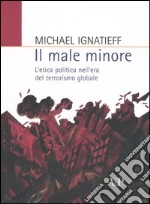 Title :
Il male minore. L'etica politica nell'era del terrorismo globale
Title :
Il male minore. L'etica politica nell'era del terrorismo globaleAuthor: Ignatieff Michael Publisher: Vita e Pensiero Si può combattere li terrorismo con il terrore, o la violenza con altra violenza? E giusto? E efficace? E qual è il prezzo da pagare? Sono interrogativi oggi più che mai urgenti. Michael Ignatieff li affronta con determinazione, autorevolezza e con un raro, equilibrato connubio di idealismo, conoscenza storica e saggezza politica. lì risultato è un'opera notevole, un'analisi dalle molte sfaccettature, il cui ampio respiro consente di accostare il delicato tema della lotta al terrorismo rimuovendo ogni rischio di banalizzazione. € 18,00
|
|
|
2005 |
 Title :
The Lesser Evil
Title :
The Lesser EvilAuthor: Ignatieff Michael Publisher: Princeton Univ Pr Must We Fight Terrorism with terror, match assassination with assassination, and torture with torture? Must we sacrifice civil liberty to protect public safety? In the age of terrorism, the temptations of ruthlessness can be overwhelming. But we are pulled in the other direction, too, by the anxiety that a violent response to violence makes us morally indistinguishable from our enemies. There is perhaps no greater political challenge today than trying to win the war against terror without losing our democratic souls. Michael Ignatieff confronts this challenge head-on, with the combination of hardheaded idealism, historical sensitivity, and political judgment that has made him one of the most influential voices in international affairs today. Ignatieff argues that we must not shrink from the use of violence-that far from undermining liberal democracy, force can be necessary for its survival. But its use must be measured, not a program of torture and revenge. And we must not fool ourselves that whatever wedo in the name of freedom and democracy is good. We may need to kill to fight the greater evil of terrorism, but we must never pretend that doing so is anything better than a lesser evil. In making this case, Ignatieff traces the modern history of terrorism and counterterrorism, from the nihilists of czarist Russia and the militias of Weimar Germany to the IRA and the unprecedented menace of Al Qaeda, with its suicidal agents bent on mass destruction. He shows how the most potent response to terror has been force, decisive and direct, but-just as important-restrained. The public scrutiny and political ethics that motivate restraint also give democracy its strongest weapon: the moral power to endure when the furies of vengeance and hatred are spent. The book is based on the Gifford Lectures delivered at the University of Edinburgh in 2003. 'Michael Ignatieff has written a sober yet chilling account of the issues facing liberal democracies in the face of modern international terrorism. In a surgical analysis he describes the challenges facing their leaders and citizens. His warning of the critical dangers of under-and over-reaction in combating terrorism could not be more timely.'-Justice Richard Goldstone, Constitutional Court of South Africa.'Michael Ignatieff's The Lesser Evil is a strikingly readable rumination on the ethical challenge of our time: How can a liberal democracy survive the long struggle against terror and do so in ways that preserve its institutions and dignity intact? His answer is a profound moral analysis, drawing on insights from philosophy, law, and literature, of how to surmount the strength of the terrorists, who are weak, and avoid the weakness of the democracies, who can be both strong and just.'-Michael Doyle, Harold Brown Professor of Law and International Affairs, Columbia University. € 29,90
|
 Title :
American Exceptionalism and Human Rights
Title :
American Exceptionalism and Human RightsAuthor: Ignatieff Michael (EDT) Publisher: Princeton Univ Pr With the 2003 invasion and subsequent occupation of Iraq, the most controversial question in world politics fast became whether the United States stands within the order of international law or outside it. Does America still play by the rules it helped create? American Exceptionalism and Human Rights addresses this question as it applies to U.S. behavior in relation to international human rights. With essays by eleven leading experts in such fields as international relations and international law, it seeks to show and explain how America's approach to human rights differs from that of most other Western nations. In his introduction, Michael Ignatieff identifies three main types of exceptionalism: exemptionalism (supporting treaties as long as Americans are exempt from them); double standards (criticizing 'others for not heeding the findings of international human rights bodies, but ignoring what these bodies say of the United States); and legal isolationism (the tendency of American judges to ignore other jurisdictions). The contributors use Ignatieff's essay as a jumping-off point to discuss specific types of exceptionalism--America's approach to capital punishment and to free speech, for example--or to explore the social, cultural, and institutional roots of exceptionalism. These essays--most of which appear in print here for the first time, and all of which have been revised or updated since being presented in a year-long lecture series on American exceptionalism at Harvard University's John F. Kennedy School of Government--are by Stanley Hoffmann, Paul Kahn, Harold Koh, Frank Michelman, Andrew Moravcsik, John Ruggie, Frederick Schauer, Anne-Marie Slaughter, Carol Steiker, and Cass Sunstein. € 48,90
|
|
2003 |
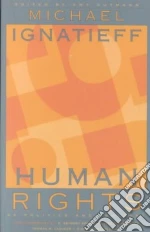 Title :
Human Rights as Politics and Idolatry
Title :
Human Rights as Politics and IdolatryAuthor: Ignatieff Michael, Gutmann Amy (EDT), Appiah Kwame Anthony (CON), Hollinger David A. (CON) Publisher: Princeton Univ Pr Michael Ignatieff draws on his extensive experience as a writer and commentator on world affairs to present a penetrating account of the successes, failures, and prospects of the human rights revolution. Since the United Nations adopted the Universal Declaration of Human Rights in 1948, this revolution has brought the world moral progress and broken the nation-state's monopoly on the conduct of international affairs. But it has also faced challenges. Ignatieff argues that human rights activists have rightly drawn criticism from Asia, the Islamic world, and within the West itself for being overambitious and unwilling to accept limits. It is now time, he writes, for activists to embrace a more modest agenda and to reestablish the balance between the rights of states and the rights of citizens. Ignatieff begins by examining the politics of human rights, assessing when it is appropriate to use the fact of human rights abuse to justify intervention in other countries. He then explores the ideas that underpin human rights, warning that human rights must not become an idolatry. In the spirit of Isaiah Berlin, he argues that human rights can command universal assent only if they are designed to protect and enhance the capacity of individuals to lead the lives they wish. By embracing this approach and recognizing that state sovereignty is the best guarantee against chaos, Ignatieff concludes, Western nations will have a better chance of extending the real progress of the past fifty years. Throughout, Ignatieff balances idealism with a sure sense of practical reality earned from his years of travel in zones of war and political turmoil around the globe. Based on the Tanner Lectures that Ignatieff delivered at Princeton University's Center for Human Values in 2000, the book includes two chapters by Ignatieff, an introduction by Amy Gutmann, comments by four leading scholars--K. Anthony Appiah, David A. Hollinger, Thomas W. Laqueur, and Diane F. Orentlicher--and a response by Ignatieff. € 33,50
|
 Title :
Isaiah Berlin. Ironia e libertà
Title :
Isaiah Berlin. Ironia e libertàAuthor: Ignatieff Michael Publisher: Carocci L'appassionata biografia di Michael Ignatieff racconta la vita di Isaiah Berlin dall'infanzia nella Russia rivoluzionaria agli anni di insegnamento a Oxford, dall'attività diplomatica a Mosca durante la seconda guerra mondiale ai numerosi incontri con uomini politici come Kennedy, Churchill o Weizmann, e con protagonisti della cultura come Eistein e Frued, Pasternak e Virginia Woolf, Wittgenstein e Picasso. € 16,10
|
 Title :
Impero light. Dalla periferia al centro del nuovo ordine mondiale
Title :
Impero light. Dalla periferia al centro del nuovo ordine mondialeAuthor: Ignatieff Michael Publisher: Carocci Viviamo in un mondo che non ha precedenti storici se non nel tardo Impero romano. Non si tratta soltanto del dominio militare esercitato da un'unica potenza, e neanche della dimensione di questo potere e della sua ostentazione. Il nuovo Impero non è come quelli del passato, fondati sulle colonie e sulla conquista. È un Impero light, un'egemonia senza colonie, una sfera d'influenza globale senza il fardello dell'amministrazione diretta e i rischi della sorveglianza continua: è un imperialismo gestito da un popolo memore del fatto che il proprio paese si è assicurato l'indipendenza ribellandosi a un Impero. È, in altri termini, un Impero privo della consapevolezza di esserlo, ma questo non ne riduce il carattere imperiale, ovvero la costante tendenza a mettere ordine in un mondo di Stati e mercati sulla base dei propri interessi personali. In forma del tutto conseguente, l'analisi di questo Impero light non inizia da Washington, la capitale dell'Impero, bensì da tre zone di frontiera - Afghanistan, Kosovo e Bosnia - in cui l'autorità e la tutela imperiale stanno assumendo una nuova identità. Ma l'Impero light sarà abbastanza robusto da riuscire a portare a termine il proprio lavoro' La schiacciante superiorità militare si trasformerà in sicurezza' € 18,00
Scontato: € 17,10
|
|
2001 |
 Title :
The Needs of Strangers
Title :
The Needs of StrangersAuthor: Ignatieff Michael Publisher: Picador USA This thought provoking book uncovers a crisis in the political imagination, a wide-spread failure to provide the passionate sense of community 'in which our need for belonging can be met.' Seeking the answers to fundamental questions, Michael Ignatieff writes vividly both about ideas and about the people who tried to live by them—from Augustine to Bosch, from Rosseau to Simone Weil. Incisive and moving,The Needs of Strangers returns philosophy to its proper place, as a guide to the art of being human. € 21,50
|
 Title :
Virtual War
Title :
Virtual WarAuthor: Ignatieff Michael Publisher: Picador USA For a decade, Michael Ignatieff has provided eyewitness accounts and penetrating analyses from the world's battle zones. In Virtual War, he offers an analysis of the conflict in Kosovo and what it means for the future of warfare. He describes the latest phase in modern combat: war fought by remote control. In 'real' war, nations are mobilized, soldiers fight and die, victories are won. In virtual war, however, there is often no formal declaration of hostilities, the combatants are strike pilots and computer programmers, the nation enlists as a TV audience, and instead of defeat and victory there is only an uncertain endgame. Kosovo was such a virtual war, a war in which U.S. and NATO forces did the fighting but only Kosovars and Serbs did the dying. Ignatieff examines the conflict through the eyes of key players--politicians, diplomats, and generals--and through the experience of the victims, the refugees and civilians who suffered. As unrest continues in the Balkans, East Timor, and other places around the world, Ignatieff raises the troubling possibility that virtual wars, so much easier to fight, could become the way superpowers impose their will in the century ahead. For a decade, Michael Ignatieff has provided eyewitness accounts and penetrating analyses from the world's battle zones. In Virtual War, he offers an analysis of the conflict in Kosovo and what it means for the future of warfare. He describes the latest phase in modern combat: war fought by remote control. In 'real' war, nations are mobilized, soldiers fight and die, victories are won. In virtual war, however, there is often no formal declaration of hostilities, the combatants are strike pilots and computer programmers, the nation enlists as a TV audience, and instead of defeat and victory there is only an uncertain endgame. Kosovo was such a virtual war, a war in which U.S. and NATO forces did the fighting but only Kosovars and Serbs did the dying. Ignatieff examines the conflict through the eyes of key players--politicians, diplomats, and generals--and through the experience of the victims, the refugees and civilians who suffered. As unrest continues in the Balkans, East Timor, and other places around the world, Ignatieff raises the troubling possibility that virtual wars, so much easier to fight, could become the way superpowers impose their will in the century ahead. € 16,60
|
|
2000 |
 Title :
Isaiah Berlin. Ironia e libertà
Title :
Isaiah Berlin. Ironia e libertàAuthor: Ignatieff Michael Publisher: Carocci L'appassionata biografia di Michael Ignatieff racconta la vita di Isaiah Berlin dall'infanzia nella Russia rivoluzionaria agli anni di insegnamento a Oxford, dall'attività diplomatica a Mosca durante la seconda guerra mondiale ai numerosi incontri con uomini politici come Kennedy, Churchill o Weizmann, e con protagonisti della cultura come Eistein e Frued, Pasternak e Virginia Woolf, Wittgenstein e Picasso. € 22,60
|
|
|
1999 |
 Title :
For Most of It I Have No Words
Title :
For Most of It I Have No WordsAuthor: Norfolk Simon, Ignatieff Essay, Norfolk Simon (PHT), Ignatieff Michael Publisher: Consortium Book Sales & Dist Simon Norfolk has photographed sites of genocide and war crimes—names that ring like a death knoll for mankind—Rwanda, Cambodia, Vietnam, Auschwitz, Dresden, Ukraine, Armenia, Namibia. His photographs are charged with an overwhelming emotional intensity as they document where humans have left their trace. They are an extraordinary record of man’s inhumanity to man. € 52,60
|
|
|
1995 |
 Title :
Blood and Belonging
Title :
Blood and BelongingAuthor: Ignatieff Michael Publisher: Farrar Straus & Giroux Until the end of the Cold War, the politics of national identity was confined to isolated incidents of ethnics strife and civil war in distant countries. Now, with the collapse of Communist regimes across Europe and the loosening pf the Cold War'd clamp on East-West relations, a surge of nationalism has swept the world stage. In Blood and Belonging, Ignatieff makes a thorough examination of why blood ties--inplaces as diverse as Yugoslavia, Kurdistan, Northern Ireland, Quebec, Germany, and the former Soviet republics--may be the definitive factor in international relation today. He asks how ethnic pride turned into ethnic cleansing, whether modern citizens can lay the ghosts of a warring past, why--and whether--a people need a state of their own, and why armed struggle might be justified. Blood and Belonging is a profound and searching look at one of the most complex issues of our time. Until the end of the Cold War, the politics of national identity was confined to isolated incidents of ethnics strife and civil war in distant countries. Now, with the collapse of Communist regimes across Europe and the loosening pf the Cold War'd clamp on East-West relations, a surge of nationalism has swept the world stage. In Blood and Belonging, Ignatieff makes a thorough examination of why blood ties--inplaces as diverse as Yugoslavia, Kurdistan, Northern Ireland, Quebec, Germany, and the former Soviet republics--may be the definitive factor in international relation today. He asks how ethnic pride turned into ethnic cleansing, whether modern citizens can lay the ghosts of a warring past, why--and whether--a people need a state of their own, and why armed struggle might be justified. Blood and Belonging is a profound and searching look at one of the most complex issues of our time. € 21,00
|
|
|
1994 |
 Title :
Scar Tissue
Title :
Scar TissueAuthor: Ignatieff Michael Publisher: Farrar Straus & Giroux The author of € 14,00
|
|
|
1993 |
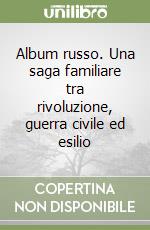 Title :
Album russo. Una saga familiare tra rivoluzione, guerra civile ed esilio
Title :
Album russo. Una saga familiare tra rivoluzione, guerra civile ed esilioAuthor: Ignatieff Michael Publisher: Il Mulino € 10,33
|
|
|
1986 |
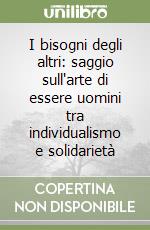 Title :
I bisogni degli altri: saggio sull'arte di essere uomini tra individualismo e solidarietà
Title :
I bisogni degli altri: saggio sull'arte di essere uomini tra individualismo e solidarietàAuthor: Ignatieff Michael Publisher: Il Mulino € 7,75
|
|